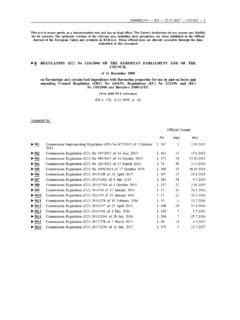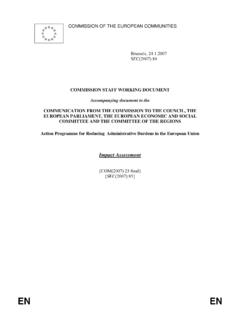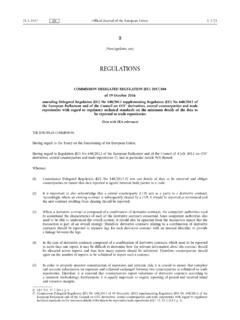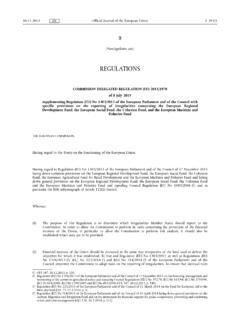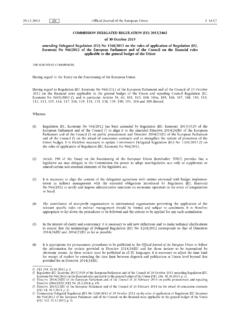Transcription of COMMISSION DELEGATED REGUL ATION (EU) No 664/2014
1 COMMISSION DELEGATED REGULATION (EU) No 664/2014 of 18 December 2013 supplementing Regulation (EU) No 1151/2012 of the European Parliament and of the Council with regard to the establishment of the Union symbols for protected designations of origin, protected geographical indications and traditional specialities guaranteed and with regard to certain rules on sourcing, certain procedural rules and certain additional transitional rules THE EUROPEAN COMMISSION , Having regard to the Treaty on the Functioning of the European Union, Having regard to Regulation (EU) No 1151/2012 of the European Parliament and of the Council of 21 November 2012 on quality schemes for agricultural products and foodstuffs (1), and in particular the first and second subparagraphs of Article 5(4), the first subparagraph of Article 12(7), Article 16(2), the first subparagraph of Article 19(2), the first sub paragraph of Article 23(4), Article 25(3), the first subparagraph of Article 49(7), the first subparagraph of Article 51(6), the first subparagraph of Article 53(3), and the first subparagraph of Article 54(2) thereof, Whereas: (1) Regulation (EU) No 1151/2012 has repealed and replaced Council Regulations (EC) No 509/2006 of 20 March 2006 on agricultural products and foodstuffs as traditional specialities guaranteed (2) and (EC) No 510/2006 of 20 March 2006 on the protection of geographical indications and designations of origin for agricultural products and foodstuffs (3).
2 Regulation (EU) No 1151/2012 empowers the COMMISSION to adopt DELEGATED and imple menting acts. In order to ensure the smooth functioning of the quality schemes for agricultural products and foodstuffs in the new legal framework, certain rules have to be adopted by means of such acts. The new rules should replace the implementing rules of Regulations (EC) No 509/2006 and (EC) No 510/2006 which were laid down in COMMISSION Regulations (EC) No 1898/2006 of 14 December 2006 laying down detailed rules of imple mentation of Council Regulation (EC) No 510/2006 on the protection of geographical indications and designa tions of origin for agricultural products and foodstuffs (4) and (EC) No 1216/2007 of 18 October 2007 laying down detailed rules for the implementation of Council Regulation (EC) No 509/2006 on agricultural products and foodstuffs as traditional specialities guaranteed (5), respectively.
3 (2) In order to take into account the specific character, and in particular the physical and material constraints, of the production of products of animal origin the name of which is registered as a protected designation of origin, derogations with regard to the sourcing of feed should be allowed in the product specification of such products. Those derogations should in no way affect the link between the geographical environment and the specific quality or characteristics of the product essentially or exclusively due to that environment. (3) In order to take into account the specific character of certain products, restrictions with regard to the sourcing of raw materials for protected geographical indications should be allowed in the product specification of such products. Those restrictions should be justified in the light of objective criteria that are in line with the general principles of the scheme of protected geographical indications and that further improve the consistency of the products with the aims of the scheme.
4 (4) In order to ensure that the appropriate information is communicated to the consumer, the Union symbols designed to publicise protected designations of origin, protected geographical indications and traditional special ities guaranteed should be established. (5) In order to ensure that product specifications for traditional specialities guaranteed only provide relevant and succinct information and to avoid excessively voluminous applications for registration or applications for approval of an amendment to a product specification of a traditional speciality guaranteed, a limit to the length of product specifications should be laid down. L 179/17 Official Journal of the European Union EN (1) OJ L 343, , p. 1. (2) OJ L 93, , p. 1. (3) OJ L 93, , p. 12. (4) OJ L 369, , p. 1. (5) OJ L 275, , p. 3. (6) In order to facilitate the application process, additional rules on national opposition procedures in case of joint applications concerning more than one national territory should be laid down.
5 Since the right to oppose should be guaranteed on the whole Union territory, the obligation to carry out national opposition procedures in all Member States concerned by the joint applications should be provided for. (7) In order to have clear steps in the opposition procedure, it is necessary to specify the procedural obligations of the applicant in case the appropriate consultations following the lodging of a reasoned statement of opposition result in an agreement. (8) In order to facilitate the handling of applications for an amendment to a product specification, complementing rules concerning the scrutiny of the amendment applications and concerning the submission and assessment of minor amendments should be laid down. Because of their emergency nature, temporary amendments should be exempted from the standard procedure and should not be subject to formal approval by the COMMISSION .
6 However, the COMMISSION should be kept fully informed about the content and the justifications of such amend ments. (9)In order to ensure that all parties have the opportunity to defend their rights and legitimate interests, comple menting rules regarding the cancellation process should be laid down. The cancellation process should be aligned to the standard procedure for registration laid down in Articles 49 to 52 of Regulation (EU) No 1151/2012. It should also be clarified that Member States are among the legal persons that may have a legitimate interest in submitting a request for cancellation under the first subparagraph of Article 54(1) of that Regulation. (10) In order to protect the legitimate interests of producers or stakeholders concerned, it should still be possible that single documents concerning protected designations of origin and protected geographical indications registered prior to 31 March 2006 and for which a single document has not been published, are published upon request of the Member States concerned.
7 (11) Article 12(3) and the first subparagraph of Article 23(3) of Regulation (EU) No 1151/2012 provide that for products originating in the Union that are marketed under a protected designation of origin, a protected geo graphical indication or a traditional speciality guaranteed, the Union symbols associated with those products have to appear on the labelling and that the relevant indications or abbreviations may appear on the labelling. The second subparagraph of Article 23(3) provides that the symbol is optional on the labelling of traditional special ities guaranteed produced outside the Union. Those provisions will only be applicable from 4 January 2016. However, Regulations (EC) No 509/2006 and (EC) No 510/2006, which were repealed by Regulation (EU) No 1151/2012, provided for the obligation to place on the labelling of products originating in the Union either the symbol or the complete indication and gave the option to use the indication traditional speciality guaranteed on the labelling of traditional specialities guaranteed produced outside the Union.
8 For the sake of continuity between the two repealed Regulations and Regulation (EU) No 1151/2012, the obligation of placing on the label ling of products originating in the Union either the Union symbols or the respective indication and the option to use the indication traditional speciality guaranteed on the labelling of traditional specialities guaranteed produced outside the Union should be considered as implicitly set out by Regulation (EU) No 1151/2012 and already applicable. In order to ensure legal certainty and to protect the rights and the legitimate interests of producers or stakeholders concerned, the conditions of use of symbols and indications on the labelling as laid down in Regula tions (EC) No 509/2006 and (EC) No 510/2006 should continue to be applied until 3 January 2016. (12) For the sake of clarity and legal certainty, Regulations (EC) No 1898/2006 and (EC) No 1216/2007 should be repealed, HAS ADOPTED THIS REGULATION: Article 1 Specific rules on sourcing of feed and of raw materials 1.
9 For the purposes of Article 5 of Regulation (EU) No 1151/2012, feed shall be sourced entirely from within the defined geographical area in respect of products of animal origin the name of which is registered as a protected designa tion of origin. Insofar as sourcing entirely from within the defined geographical area is not technically practicable, feed sourced from outside that area can be added, provided that the product quality or characteristic essentially due to the geographical environment are not affected. Feed sourced from outside the defined geographical area shall in no case exceed 50 % of dry matter on annual basis. L 179/18 Official Journal of the European Union EN 2. Any restrictions to the origin of raw materials provided in the product specification of a product the name of which is registered as a protected geographical indication shall be justified in relation to the link referred to in point (f)(ii) of Article 7(1) of Regulation (EU) No 1151/2012.
10 Article 2 Union symbols The Union symbols referred to in Articles 12(2) and 23(2) of Regulation (EU) No 1151/2012 are established as laid down in the Annex to this Regulation. Article 3 Limitation of product specifications for traditional specialities guaranteed The product specification referred to in Article 19 of Regulation (EU) No 1151/2012 shall be concise and shall not exceed 5 000 words, except in duly justified cases. Article 4 National opposition procedures for joint applications In case of joint applications as referred to in Article 49(1) of Regulation (EU) No 1151/2012, the related national oppo sition procedures shall be carried out in all the Member States concerned. Article 5 Notification obligation concerning agreement in opposition procedure When the interested parties reach an agreement following the consultations referred to in Article 51(3) of Regulation (EU) No 1151/2012, the authorities of the Member State or of the third country from which the application was lodged shall notify the COMMISSION of all the factors which enabled that agreement to be reached, including the opinions of the applicant and of the authorities of a Member State or of a third country or other natural and legal persons having lodged an opposition.




